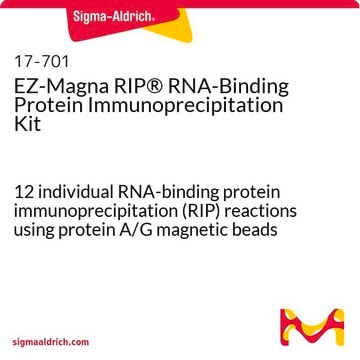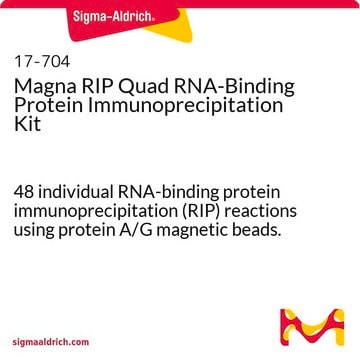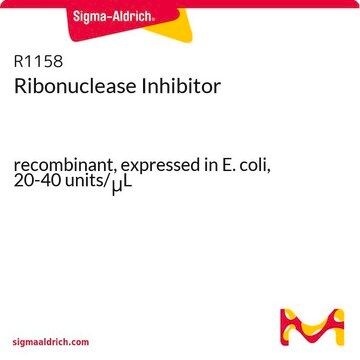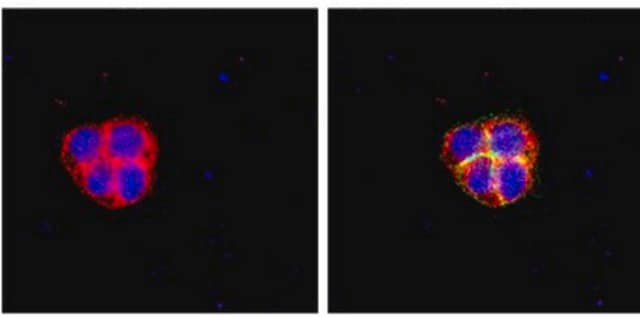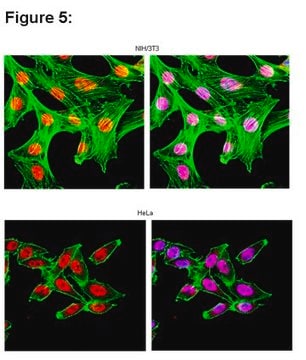RIP
Imprint® RNA Immunoprecipitation Kit
High-capacity Protein A magnetic beads for successful RNA Immunoprecipitation,suitable for use with mRNA and microRNA
Sinónimos:
Magnetic Bead RNA Immunoprecipitation, RNA Immunopreciptation, mRNA Immunopreciptation, microRNA Immunoprecipitation
About This Item
Productos recomendados
Quality Level
General description
Learn more about this product and view application data.
Application
- Suitable for downstream applications
- Individual target characterization to genome-wide profiling techniques
- Characterization of signal transduction pathways
- Verification of ChIp-chIP and ChIP-seq data
Features and Benefits
- Xtra Protein A magnetic beads with higher binding capacity
- Step-by-step protocols for cell lysis and immunoprecipitation
- RNAse inhibitors and RNAse-free reagents to maintain RNA integrity
- Negative control and antibody included
Legal Information
Los componentes del kit también están disponibles por separado
- I5381IgG from mouse serum, reagent grade, ≥95% (SDS-PAGE), lyophilized powderSDS
- I5006IgG from rabbit serum, reagent grade, ≥95% (SDS-PAGE), essentially salt-free, lyophilized powderSDS
- M7023Anti-Mouse IgG (whole molecule) antibody produced in rabbit, IgG fraction of antiserum, buffered aqueous solutionSDS
- P8340Protease Inhibitor Cocktail, for use with mammalian cell and tissue extracts, DMSO solutionSDS
- R1158Ribonuclease Inhibitor, recombinant, expressed in E. coli, 20-40 units/μLSDS
Optional
Required but not provided
signalword
Warning
hcodes
Hazard Classifications
Aquatic Chronic 3 - Eye Irrit. 2 - Flam. Liq. 3 - Skin Irrit. 2
Storage Class
3 - Flammable liquids
wgk_germany
WGK 3
flash_point_f
100.4 °F
flash_point_c
38 °C
Elija entre una de las versiones más recientes:
Certificados de análisis (COA)
Lo sentimos, en este momento no disponemos de COAs para este producto en línea.
Si necesita más asistencia, póngase en contacto con Atención al cliente
¿Ya tiene este producto?
Encuentre la documentación para los productos que ha comprado recientemente en la Biblioteca de documentos.
Los clientes también vieron
Artículos
Sigma’s Imprint RNA Immunoprecipitation Kit was used to copurify human argonaute 2 (Ago2)-associated RNAs from HeLa cells. MicroRNAs reverse transcribed and quantitating using Mysticq reagents.
Protocolos
Procedure and protocol for Anti Ago-RNA Immunoprecipitation from mammalian cells using the RIP kit
Nuestro equipo de científicos tiene experiencia en todas las áreas de investigación: Ciencias de la vida, Ciencia de los materiales, Síntesis química, Cromatografía, Analítica y muchas otras.
Póngase en contacto con el Servicio técnico

